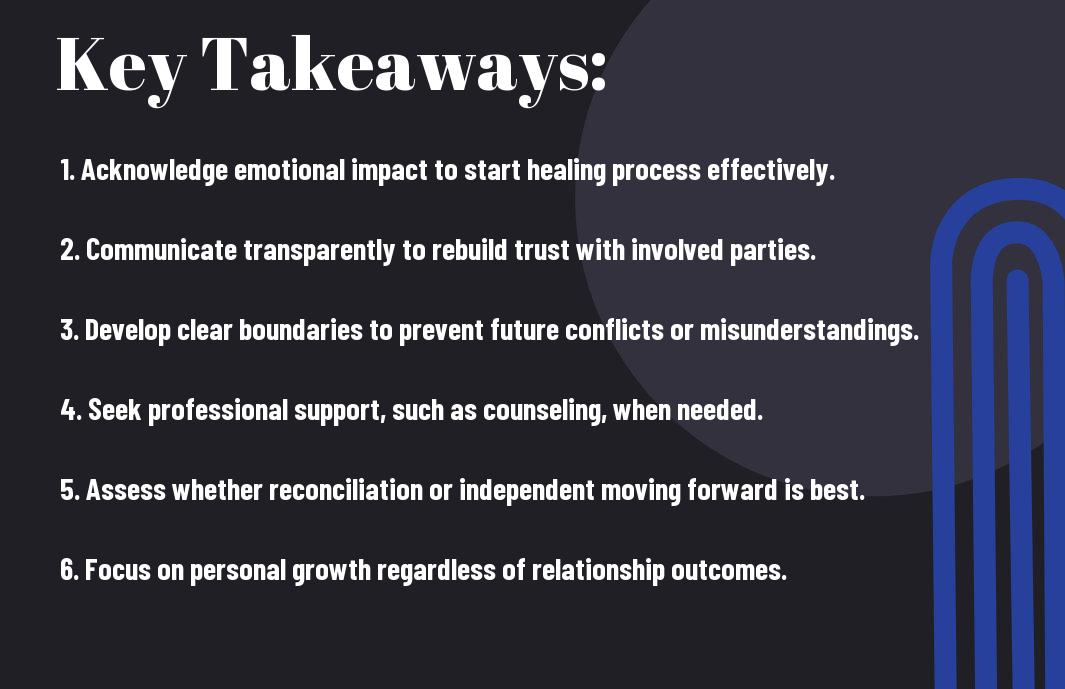Just navigating the aftermath of an investigation can feel overwhelming, as you weigh the decision to rebuild trust with those around you or choose to move forward independently. This phase is crucial for your personal and professional growth, impacting future relationships and opportunities. Understanding the nuances of recovery and the options available will empower you to make informed choices, guiding your path to healing and resilience. In this post, we’ll explore effective strategies that can help you assess your situation and determine the best course of action for your future. Our therapists at Digital Forensic Squad specialize in assisting you with recovery after infidelity.
Key Takeaways:
- Rebuilding trust requires open communication and transparency, ensuring that all parties are kept informed throughout the recovery process.
- Assessing the willingness of all involved to move forward collaboratively can determine whether the focus is on rebuilding relationships or progressing independently.
- Establishing clear action plans and follow-ups post-investigation is vital to restore confidence and prevent future issues.

Understanding the Impact of Investigations
The impact of investigations extends beyond immediate findings, affecting both individuals and the broader organization. You may experience shifts in relationships, morale, and overall workplace dynamics. Understanding these effects is imperative for navigating the recovery phase effectively, allowing you to make informed decisions about rebuilding trust—or perhaps moving forward independently.
Emotional and Psychological Effects
Across various levels, investigations can trigger a range of emotional responses, from anxiety and stress to feelings of betrayal and distrust. You may find that these emotions resonate not only within yourself but also among your colleagues, creating a challenging atmosphere that can hinder productivity and collaboration.
Organizational Consequences
One of the most significant repercussions of investigations is the lasting impact on organizational culture and structure. You may observe a decline in employee engagement, increased turnover rates, and a general atmosphere of uncertainty that can stifle innovation and collaboration.
Understanding these organizational consequences involves recognizing how investigations can alter communication patterns, disrupt team cohesion, and erode trust in leadership. You might find that departments struggle to align, resulting in inefficiencies and missed opportunities. Your role in fostering an inclusive environment becomes even more important as you navigate these challenges, whether by advocating for transparency or initiating open dialogues to restore confidence in the workplace dynamics.

The Process of Rebuilding Trust
Clearly, rebuilding trust after an investigation is an intricate process that requires dedication and intentionality. You must commit to understanding the root causes of the issue while engaging those affected in meaningful dialogue. This process not only seeks to rectify past mistakes but also fosters an environment where trust can flourish again, paving the way for healthier relationships moving forward.
Acknowledging Past Mistakes
An important first step in rebuilding trust is acknowledging your past mistakes. It is vital to recognize the impact of your actions on others and accept responsibility for the consequences. By doing so, you demonstrate accountability and set the foundation for a genuine path toward healing and restoration.
Open Communication and Transparency
Behind every effort to rebuild trust lies the need for open communication and transparency. You should foster an environment where concerns can be voiced freely, allowing for ongoing dialogue that addresses the underlying issues created by the investigation.
Hence, maintaining a commitment to open communication and transparency establishes clarity and understanding among all parties involved. You should create regular touchpoints for discussions, encouraging honest feedback and ensuring everyone feels heard. By actively sharing information and updates about your progress towards recovery, you foster trust and show your willingness to involve others in the journey, reinforcing the importance of collective accountability and collaboration going forward.
Strategies for Effective Recovery
For individuals navigating recovery after an investigation, implementing effective strategies is important. Fostering open communication and establishing transparency can significantly aid in rebuilding trust.
Implementing Changes and Improvements
One way to support recovery is by addressing identified issues promptly. Actively seek feedback from your team or community and implement changes that demonstrate your commitment to a safer and more supportive environment. This adaptability can foster confidence and re-establish your reputation.
Encouraging Team Collaboration
Along the path of recovery, encouraging collaboration within your team can create a more inclusive atmosphere. By fostering teamwork, you enable collective problem-solving and contribute to rebuilding the shared trust that may have been lost in the investigation.
Team dynamics can significantly impact the recovery process. By prioritizing collaboration, you empower each member to contribute their insights and ideas, creating a sense of ownership and accountability. Regular team-building activities and open forums for discussion can help strengthen these bonds, fostering mutual support and understanding as you collectively move forward.
When to Move Forward Alone
Now is the time to evaluate if rebuilding trust is feasible or if it’s healthier for you to move forward alone. Sometimes, the experience of an investigation can reveal deeper underlying issues in relationships, prompting you to reconsider their viability. Trust your instincts and assess whether the relationship is worth nurturing or if it’s better to seek a fresh start on your own.
Recognizing Toxic Relationships
Recognizing toxic relationships is vital for your emotional well-being. Look for patterns of manipulation, disrespect, or consistent negativity that drain your energy and happiness. A toxic relationship can hinder your personal growth and leave you feeling unsupported or unvalued. Assess how your relationships affect your self-esteem and overall mental health, and be prepared to make difficult choices for your future.
Embracing Independence
Toxic relationships can cloud your vision and prevent you from experiencing life to its fullest. Embracing independence means taking the first steps toward a more fulfilling and authentic existence, free from unhealthy attachments. It involves prioritizing your needs, exploring your interests, and nurturing your self-worth beyond the confines of a relationship. Stepping into your own power is not just liberating; it’s a transformative journey toward personal empowerment and happiness.
Move beyond dependency by exploring new opportunities that reflect your interests and values. This can be anything from picking up a new hobby to forging new friendships, allowing you to build a life that resonates with who you truly are. As you cultivate independence, you’ll develop a stronger sense of self and the confidence needed to make healthier choices in the future, both personally and in your relationships.
Role of Leadership in Recovery
All effective recovery processes hinge on the active involvement of leadership. As a leader, you have the power to guide your organization toward rebuilding trust and fostering resilience. By demonstrating commitment, transparency, and accountability, you can pave the way for a healthier workplace culture. Your role is to inspire your team, ensuring they feel supported and engaged as they navigate the recovery journey together.
Leading by Example
One of the most impactful ways to lead during recovery is to set a strong personal example. When you exhibit honesty, openness, and empathy, you create a blueprint for your team to follow. By sharing your own experiences and challenges, you humanize the leadership role, encouraging others to embrace vulnerability and actively participate in rebuilding efforts.
Cultivating a Trustworthy Environment
About creating a trustworthy environment, it’s imperative to establish clear communication and consistent actions. You should foster a culture where team members feel safe expressing their concerns and ideas. This openness not only promotes collaboration but also strengthens relationships, making it easier for your team to move forward together.
Plus, trust is built through consistent actions over time. You can implement regular check-ins, solicit feedback, and encourage dialogue about experiences during the recovery process. As you model transparency and integrity, your efforts will gradually cultivate a supportive atmosphere where employees feel valued and respected. Such an environment not only aids in recovery but also lays the groundwork for long-term success.
Measuring Recovery Success
Your ability to measure recovery success is foundational in rebuilding trust or determining whether to move forward alone. It involves assessing the effectiveness of your strategies and understanding the impact of your actions on relationships and overall well-being. By employing systematic approaches, you can gauge progress, identify areas for improvement, and celebrate milestones that signify healing and growth.
Feedback Mechanisms
Among the various ways to measure recovery, feedback mechanisms play a vital role. Actively seeking and receiving input from stakeholders can help you evaluate the effectiveness of your actions and identify potential blind spots. This ongoing dialogue fosters transparency and encourages continuous improvement, enabling you to adjust your strategies based on real-time information.
Setting Achievable Goals
Across your recovery journey, setting achievable goals is necessary for sustained progress. By breaking down larger objectives into smaller, manageable tasks, you create a clear pathway towards recovery that promotes motivation and accountability. Achievable goals help you maintain focus and celebrate incremental achievements, reinforcing your drive to rebuild trust or move forward with confidence.
Due to the nature of recovery, it is vital to establish realistic and measurable goals that reflect your current situation and capacity. These goals should be specific, time-bound, and relevant to your desired outcomes. By setting such objectives, you give yourself the opportunity to track your growth effectively. Regularly revisiting and adjusting these goals will ensure they remain aligned with your evolving needs, enhancing your chances of sustained success and fostering a sense of accomplishment along your recovery path.
Final Words
To wrap up, recovering after an investigation requires a thoughtful approach to either rebuild trust with your team or assess whether moving forward alone is the best option. You must evaluate the impact of the investigation on your relationships and organizational dynamics. By engaging in open communication and demonstrating accountability, you can foster a path to recovery and growth. However, if trust cannot be restored, you need to have the clarity to lead independently, ensuring your focus remains on future success and positive outcomes.
Q: What are the key steps involved in rebuilding trust after an investigation?
A: Rebuilding trust after an investigation involves several key steps. First, it is necessary to acknowledge the situation and express genuine remorse for any wrongdoing or misunderstanding that occurred. Next, consistent communication is vital; being open and transparent about the findings and how they affect the relationship can help ease concerns. Additionally, taking actionable steps to rectify the identified issues, such as implementing new policies or improving practices, is important. Finally, allowing time for healing is necessary, as trust is built gradually through positive actions and experiences.
Q: How can one effectively move forward alone if rebuilding trust is not possible?
A: If rebuilding trust is not feasible, moving forward alone involves focusing on personal growth and establishing new boundaries. Individuals should assess the lessons learned during the investigation and reflect on their own values and priorities. It’s beneficial to set realistic goals for the future and seek new opportunities that align with these personal objectives. Additionally, cultivating supportive relationships with others who share similar values can provide encouragement and motivation. Engaging in self-care practices to enhance mental and emotional well-being is also necessary during this transition.
Q: What role does communication play in the recovery process after an investigation?
A: Communication plays a vital role in the recovery process following an investigation. Effective communication helps clarify misunderstandings and provides a platform for expressing thoughts and feelings. It fosters an environment of openness where all parties can voice their concerns and experiences. This transparency is important for rebuilding relationships, as it can help all involved to feel heard and validated. Furthermore, ongoing dialogue about the changes being made in response to the investigation can demonstrate a commitment to improvement and rebuilding trust over time.
Resources:

